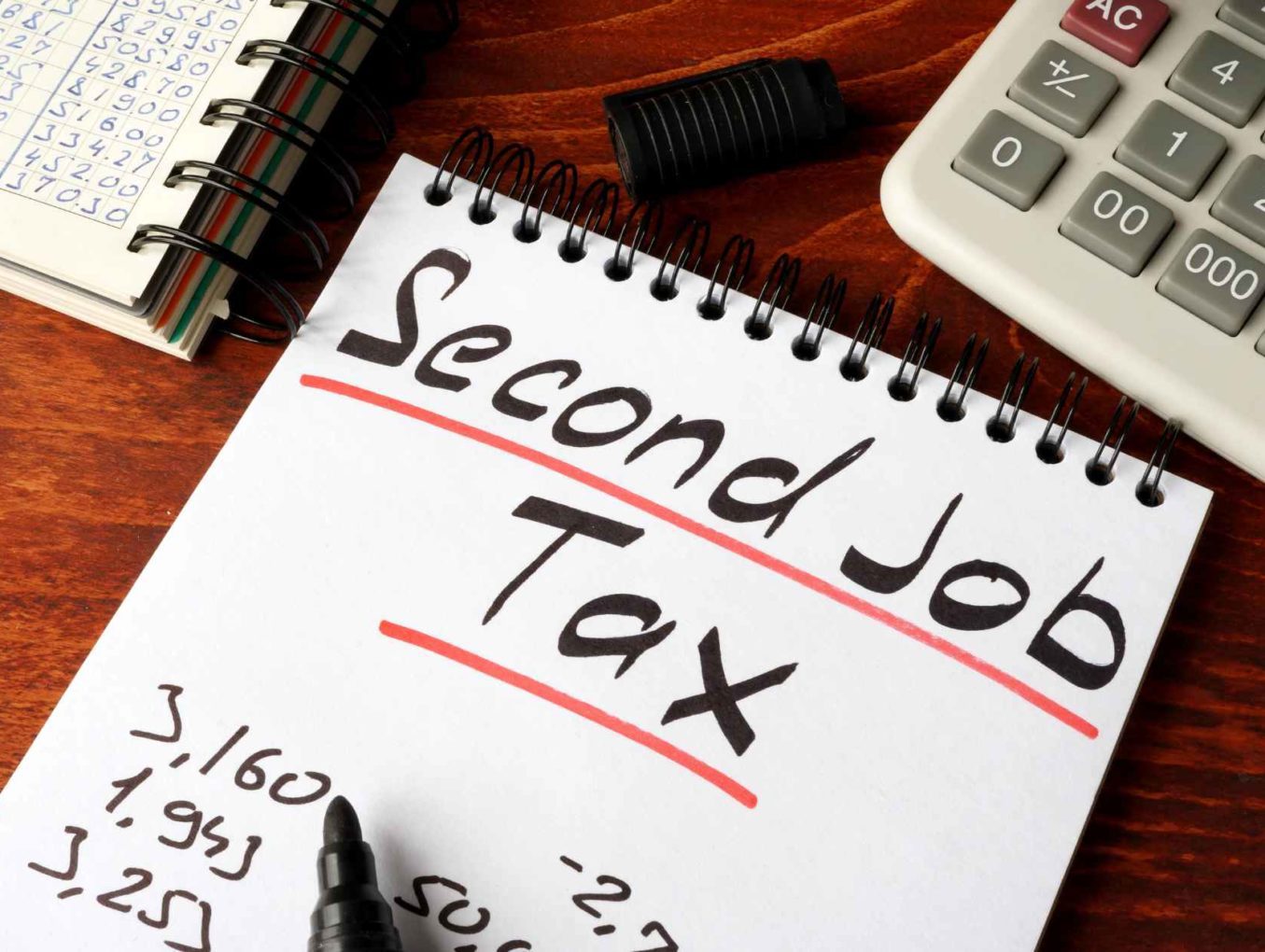How Do Taxes Work When You Have Two Jobs or More?
Income earned from any job must be reported to the IRS. When you have a second job, this extra income may bump you up to a higher tax bracket. For example, if a single, unmarried individual made $80,000 in 2022 from their primary job and $10,000 in 2022 from a part-time job, the gross income reported on their federal taxes would be $90,000.
The 2022 tax brackets for single, unmarried individuals relevant to this income are:
- 22% marginal tax rate for $41,776 to $89,075
- 24% marginal tax rate for $89,076 to $170,050
The extra $10,000 in income from a second job pushed the taxpayer into a higher tax bracket that increased their marginal tax rate from 22% to 24%. In some cases, extra taxes on a second job will absorb some of your additional income.
As a very simple calculation using our example (not including deductions and tax credits), taxes on $80,000 at 22% are $17,600, and taxes on $90,000 at 24% are $21,600. Therefore, the additional $10,000 in income added $4,000 in taxes. Around $1,800 of that amount is from moving to a higher tax bracket.
Do You Have to Report Multiple Jobs on a W4?
Form W4 (Employee’s Withholding Allowance Certificate) is used to calculate the amount of federal taxes withheld on an individual’s wages each year. Taxpayers can request a specific withholding allowance that dictates how much taxes an employee takes out from weekly, biweekly, or monthly paychecks.
“Allowances” are often called “dependents” to help clarify the term. Claiming zero allowances means you will have the maximum amount of taxes taken from your gross wages per paycheck. The more allowances you claim, the more wages you will take home due to fewer taxes taken from each paycheck.
Taxpayers must fill out a W4 form for each employer that hires them and issues them a paycheck. Individual W4 forms are meant to indicate how much tax an employee wants to be taken out of a paycheck issued by an employer. If you work three jobs, you should have three unique W4s on file with your employers.
Alternatively, you can consider calculating your withholding for the employer if you don’t want to fill out another W4. However, this could mean you owe more taxes when you file if you didn’t calculate the correct withholding amount.
Will You Receive Multiple W2s If You Have a Second Job?
If you do not work as a freelancer, you will receive a W2 from each of your employers. For example, Bob works full-time during the day as a bank loan officer and part-time as a car salesman on the weekend. At the end of the year, Bob receives a W2 from the bank and a W2 from the car dealership.
Since freelancers are considered self-employed and do not receive W2s, they have several options for having taxes taken from their income. In addition, gig workers should be aware that if they make over $400 in one year, they must file a federal tax return.
Does Having Two Jobs Put You in a Higher Tax Bracket?
It depends. Having two or more jobs may put you in a higher tax bracket. Marginal tax rates for individual single taxpayers increase at $41,775 (22%), $89,075 (24%), $170,050 (32%), and $215,950 (35%). You can view the current IRS tax rates for both individuals and married couples at https://irs.gov/newsroom/irs-provides-tax-inflation-adjustments-for-tax-year-2022.
It is always a good idea to calculate what tax bracket a second job puts you in and how much you’ll pay in extra taxes. Depending on your tax bracket, earning double income may mean you pay nearly half of what you make in federal taxes.
Do You Lose EITC When You Have Two Jobs?
The Earned Income Tax Credit is intended for low-income earners with dependent children who depend on tax refunds to help them financially. As long as your total income for one tax year doesn’t exceed EITC income limits, having two jobs will not disqualify you from claiming EITC.
To qualify for EITC, your reported earned income from one or more jobs must be less than $59,187 and you must have at least one qualifying dependent child.
How Much Can You Earn from Side Jobs Without Paying Taxes?
You can work as many side jobs as you want without needing to file a 2022 tax return if:
- You are single, under 65, and your total income is less than $12,550.
- You are married, filing jointly, under 65, and the total of you and your spouse’s income is less than $25,100.
- You are married filing separately, any age, and your total income is less than $5.
- You are head of household, under 65, and your total income is less than $18,000.
- You earned less than $400 as a self-employed individual or from gig work.
Need help? You can schedule a free call or start online by answering 6 simple questions. We never charge for ‘investigations’ or consultations.
6 Simple Questions. Free Evaluation.
Join our Newsletter
Enter your email address to join our free newsletter. Get all the latest news and updates.

